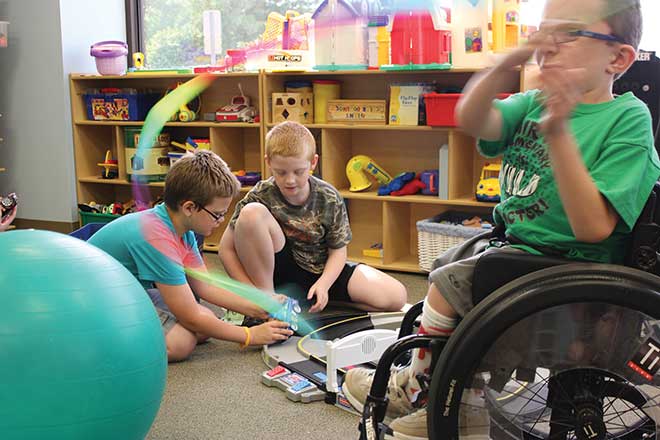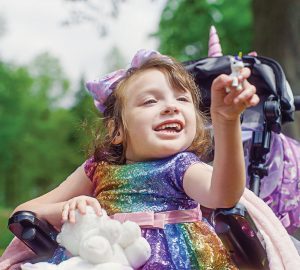For children with autism, a neurodevelopmental disorder that impacts 1 in 68, getting proper treatment can make a world of difference. Dr. Stephen Kanne, executive director of the Thompson Center for Autism and Neurodevelopmental Disorders at the University of Missouri, recalls an email from a mother whose son had received services at the center. “He had just graduated high school, and for that she was extremely grateful,” Kanne says. “We diagnosed properly and gave that child the right tools to succeed.”
 Kanne has endless examples like this, of children whose lives have been changed because of the Thompson Center. Founded in 2005, it is dedicated to improving the lives of families impacted by autism and related disabilities and is the largest center of its kind in Missouri. Its three-pronged mission of clinical intervention and autism care, education and research makes it unique, Kanne says. “The clinical piece is essential to helping kids, but we’re also one of the few centers with training and research missions. We train organizations in Missouri and around the world on how to work with kids with autism.”
Kanne has endless examples like this, of children whose lives have been changed because of the Thompson Center. Founded in 2005, it is dedicated to improving the lives of families impacted by autism and related disabilities and is the largest center of its kind in Missouri. Its three-pronged mission of clinical intervention and autism care, education and research makes it unique, Kanne says. “The clinical piece is essential to helping kids, but we’re also one of the few centers with training and research missions. We train organizations in Missouri and around the world on how to work with kids with autism.”
There currently is no cure for autism, and researchers have yet to unravel the mystery of its causes. But more is learned every year, Kanne says, adding that the center recently was selected for participation in a major national genetic research project. “Translating new knowledge into better care is our priority,” he notes. “When research started decades ago, we had this naïve thought that we had to identify just a few genes that contribute to autism. The current count is between 600 and 1,000.”
Although the cause remains elusive, effective treatment does exist. One option provided by the Thompson Center is applied behavioral analysis (ABA). “Of all the treatments available, ABA has the most scientific evidence supporting it,” Kanne notes. After analyzing why a child exhibits certain behaviors and what motivates them, our providers create an environment that reinforces desired behaviors. “The treatment is fun and positive, and it changes the child’s actions,” Kanne says. “ABA has taught kids proper social skills and has even gotten them talking for the first time.”
In September 2015, the Thompson Center opened a pediatric neuropsychology clinic, where young adults and children with autism and other neurological conditions can receive a detailed assessment of their learning skills. This helps the center formulate individualized learning strategies and decide on the best course of treatment for social, communication and behavioral issues, Kanne says.
Early diagnosis and treatment is essential to helping individuals with autism succeed, but the level of care provided by the center is costly. To help with that, the Thompson Foundation, the center’s fundraising arm, hosts the 10th annual It’s in the Cards benefit auction May 5 at the Four Seasons Hotel St. Louis. Cardinals third baseman Matt Carpenter and his wife Mackenzie are co-chairs. “We could not do the work we do at the Thompson Center if not for the foundation and people supporting it,” Kanne says. “In almost every case of providers seeing patients, whether it’s our physicians, psychologists, speech language pathologists or occupational therapists, the amount we’re paid doesn’t cover the cost. The foundation keeps our doors open.”
It’s in the Cards, the 10th annual auction benefiting Thompson Foundation for Autism and Neurodevelopmental Disorders, takes place May 5 at the Four Seasons Hotel St. Louis. Pictured on the cover: co-chairs Matt and Mackenzie Carpenter. For more information, call 314.550.2888 or visit thompsonfoundation.org.
Cover design by Julie Streiler | Cover photo courtesy of St. Louis Cardinals
Pictured above: The Thompson Center’s Applied Behavior playroom, courtesy of Thompson Foundation








